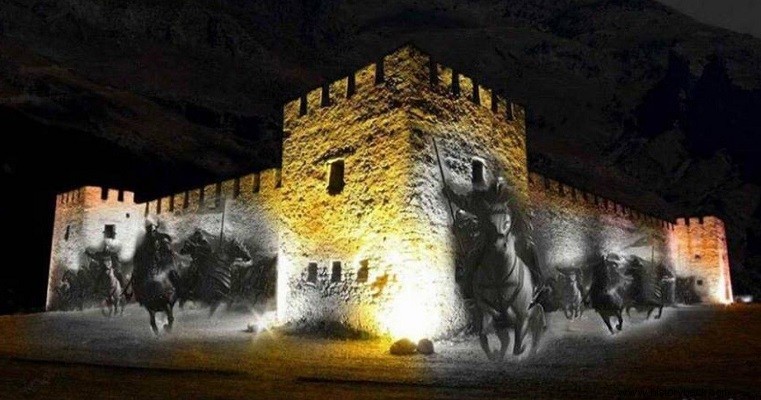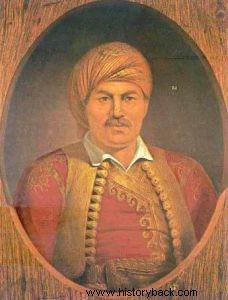
"HIPPERCHUS OF THE FIGHT OF PALIGENESIA", says the bust of the warlord Hatzimichalis Dalianis, in the garden of heroes, in Delvinaki of Ioannina, which bowed to his heroism and his struggle, for the liberation of slavery from the Ottomans Homeland. The hero was born in 1775 in Delvinaki Pogoni in the enslaved Epirus. He breathed his last defending Frangokastelos in Crete on May 18, 1828. 9 years ago the Municipality of Sfakia twinned with the Municipality of Pogoni, as a small tribute to the captain of the fight.
His name was Michael Christou. As explained by the mayor of Pogoni, Kostas Kapsalis, who gives us historical facts about the brave personality of Michael Christos, "Hatzis" was added to his name, because he allegedly traveled to the Jordan River where he was baptized, while Dalianis was given to him by weapon of the time, short Italian, the daliani. The young man from Epirus went to study in Italy, but engaged in the tobacco industry in Trieste, a profitable business, from which he acquired a large fortune. In 1816, he was initiated by the brothers Alexandros and Michael Vassiliou from Argyrokastro, in Filiki Etairia and now only "sees" the path for the liberation of the homeland.
His property is available in the Game and liquidated. At his own expense, he forms a cavalry corps, the first in Greece, while offering 16,163 grosci to the national treasury. In 1826, he arrived in Lebanon with three ships which he chartered and 800 volunteers, intended to support the eventual uprising against the Ottoman Empire by Emir Bashir, as a counter-distraction move. When he arrived in Lebanon, the emir's intentions had changed and he returned to Greece. He then participates in the battles against Ibrahim in the Peloponnese and Central Greece. He fights on the side of Georgios Karaiskakis.
In 1827 he was awarded the position of Commander in Chief of the Dissolute Cavalry of Greece. This is followed by his transfer to Crete, to lead the revolution at the head of 500 men and 100 horsemen, of which, according to historical sources, 385 were Epirotes. The warlord, in January 1828, landed in Gramvousa, which was initially his base, while he then camped in Fragokastello, southeast of Sfakia.
Mustafa Pasha of Kydonia, as soon as he was informed of the arrival of Hatzimihalis, threatens the Sfakians with firmans and encamps with 8000 soldiers, 400 horsemen and heavy artillery, opposite the Frankokastello. At the same time, he sends a firman to Hatzimichalis Dalianis to leave the place, within 10 days. He replies that he came to Crete to fight with the help of God and to win. He immediately proceeds to capture Frangokastel. The Sfakians urgently ask him to leave a few men at Frangokastelo and climb the mountain to fight Mustafa Pasha from there when he attacks the fortress. Hatzimichalis, who believed in his cavalry, remained in the castle and began to build stone bastions in a radius of about 300 meters from the fortress.
On May 13, the Turks gather all their forces near Frangokastelo and the attack begins 5 days later at dawn on the 18th. The battle was fierce and unequal. The Turks are outnumbered and heavily armed. In a bastion, about 100 soldiers of Hatzimihalis are killed by the Ottomans, together with Kyriakoulis Argyrokastritis. Hatzimichalis then leaves the castle with the cavalry to bring the men from the other two bastions into the fortress. The battle at the gate bloody. The hero's sword was broken, his horse was wounded, and surrounded on all sides he was slaughtered. His head went as a trophy to Mustafa Pasha.
Together with Hatzimichalis Dalianis, about 350 Greek heroes who came to Crete and fought for the independence of the homeland stayed forever in Frankokastello. In his memoirs, Makrygiannis gives credit to Hatzimichalis and his men for their bravery and self-sacrifice. According to historical sources, the origin of Hatzimichalis Daliani's family is the village of Vouliarati in Dropoli. Today in Vouliarati the surname Dalianis is still preserved, while the family is distinguished for its high economic and educational level.

APE-ME
